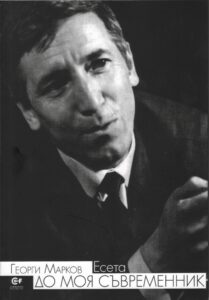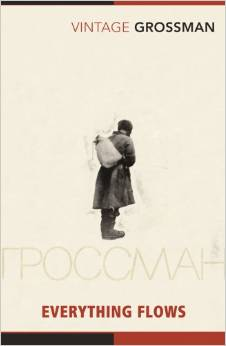One of the key messages of Alexander Solzhenitsyn’s “Two Hundred Years Together” is that the October Revolution, Bolshevism, and communist ideology in general are essentially Jewish “projects.” The intelligence apparatus, the systematic murder of regime opponents, the creation of the Gulag system in which millions of people were enslaved and murdered: it is mainly the Jews who are to blame. (He does not say it so flatly, but in the end this is what really matters to him). So whoever today is an anti-Semite, one could conclude by implication, only proves his anti-communism convincingly. And if there were acts of violence against Jews in Eastern Europe apart from the Nazi crimes, it was self-defense or revenge for communist injustice suffered, and in fact they meant only the Jewish political commissars … – this is how for example Paul Goma justifies today the murder of the Jews, committed by Romanians during WWII. And in Bulgaria, too, this form of anti-Semitism is a daily affair among staunch anti-communists. The more so today, where openly anti-Semitic political parties are in the government.
Therefore, when the Bulgarian writer Theodora Dimova publishes a strangely conspiratorial text in the otherwise respectable portal “Kultura”, a text that ostensibly commemorates the anniversary of the bombing of Sofia’s Sv. Nedelja Church in 1925, while emphasizing at the same time the struggle of the Bolsheviks against the Christian religion (which in the context of this terrorist act represents a falsification of history, since its motivation was quite different), this may at first sight seem a little outlandish. But the author, who often refers to “Christian values” in her public statements and laments the lack of a “spiritual elite” in Bulgaria, may be having in mind the approaching Orthodox Easter celebrations that coincide with the Jewish Passover feast this year?
What follows is a long-winded series of biblical quotations and hermeneutical remarks, all of which point to the continuity of the hatred of the enemies of Christ and Christianity – then as now: the Jews, as many readers who understand Dimova’s wink will surely say. They murdered Christ and they are behind Bolshevism, the ideology of the Anti-Christ. Dimova is too clever, she does not mention the Protocols of the Elders of Zion. But the Jewish Passover feast and the invention of Jews abducting and slaughtering Christian children to drink their blood are well known to most Bulgarians, and the timing of the publication is obviously no coincidence. The Blood Libel, a ritual murder legend is believed by many people in Eastern Europe until today or at least found to be “interesting”. And there are also openly violent-pornographic anti-Semitic works, from Adolf Hitler to Henry Ford and Fred Leuchter, prominently placed and advertised in almost every bookstore in Bulgaria and sold by the tens of thousands. In such an environment, it is no longer necessary to be more explicit. Almost anyone who wants to understand the subtext understands it. One mentions the religious hostility of the (Jewish) Bolsheviks against Christianity, one speaks long and widely about the (Jewish) Christ murderers, quotes from biblical sources (thus unsuspiciously), and publishes everything a few days before Passover, the period when Jews are according to the Blood Libel looking for Christian children to sacrifice . The context is unambiguous: “We understand”.
Of course, all this is not conclusive proof of an intention. But the subtext is there. And the author is not naïve. However, anyone who babbles about “Christian values” and “spiritual elite” and then uses anti-Semitic clichés, only shows that he / she stands neither for these values, nor belongs to a spiritual elite, but to a dull mass of eternal-yesterday people.
The dilemma of the democratic right wing and conservatism in Bulgaria is that apart from militant verbal anti-communism, they have nothing to offer. There are no real values that they stand for and the ideology that they are shouting about and whose monuments they want to dispose of, is already dead (its enterprising heirs though are alive and kicking). There is a lack of a unifying, positive thought, a social vision. Moreover, there is no delimitation from the enemies of a democratic and pluralistic community from the extreme right. The tsarist and fascist dictatorship before the Communist takeover are being glorified, the main responsible for the murder of more than 11,000 Jews is counter-factually declared the “savior of the Bulgarian Jews”, General Lukov, a particularly close friend of the Gestapo and head of the Bulgarian legions is whitewashed into a hero and brave anticommunist, surviving members of these organizations who participated in crimes against humanity, are portrayed as great democrats and true patriots and given every podium (including the European Parliament) to spread their fake version of history to the applause of many Bulgarian intellectuals. The terrorist and anti-Semitic VMRO is today, only slightly revamped, a ruling party in Bulgaria. And so it goes on – the media and history books are now being “adapted” accordingly.
Today, Bulgaria is even further away than ever from making progress on the way to an open society. On the contrary, we are experiencing today the almost complete collapse of any intellectual honesty and decency. Bulgaria’s misery is not primarily due to the existence of corruption and organized crime, but to the indolence, cynicism and moral failure of a large part of the Bulgarian intelligentsia. The intellectually completely irrelevant article by T. Dimova is a menetekel.

Alexander Solschenizyn: Two Hundred Years Together, Herbig 2015
© Thomas Hübner and mytwostotinki.com, 2014-8. Unauthorized use and/or duplication of this material without expressed and written permission from this blog’s author and/or owner is strictly prohibited. Excerpts and links may be used, provided that full and clear credit is given to Thomas Hübner and mytwostotinki.com with appropriate and specific direction to the original content.







 Facebook
Facebook RSS
RSS Twitter
Twitter